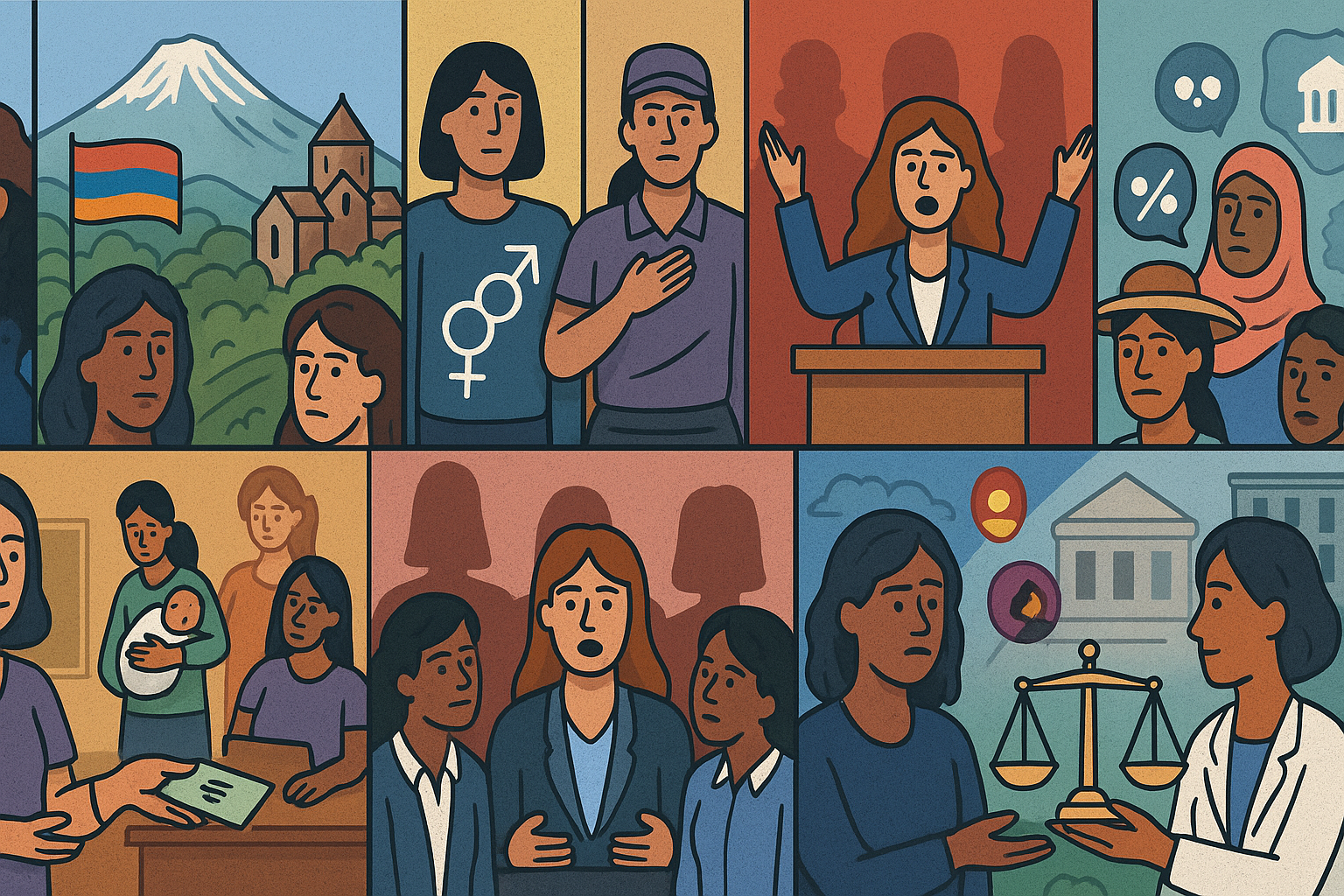Women’s Rights and Empowerment in Armenia
17 November 2025 |
Background
Green Armenia NGO with funding from the German Federal Foreign Office’s Eastern Partnership Program (Program for “Expansion of Cooperation with Civil Society in the Eastern Partnership Countries and Russia”), in partnership with Araminta gUG, has launched “Voices in Action project” – a 20-episode video podcast series – Women’s Platform – amplifying women’s voices across Armenia.
The Women’s Platform series spotlights 20 women from rural and urban communities — including human rights defenders, journalists, politicians, and grassroots leaders — who share their journeys of resilience, leadership, and the fight for gender equality, civic participation, and human rights.
The stories have not only captured the courageous journey of women in a predominantly patriarchal society, but have also helped generate a set of key issues and recommendations for various stakeholders towards a more equal society. This topic is particularly important in the context of the EU-Armenia free visa liberalization process and Armenia’s broader euro-integration trajectory.
Summary of Key Issues and Advocacy Recommendations
Key Issues Identified from the ‘Women’s Platform’ Podcast Series
- Gender Stereotypes & Societal Expectations
Gender stereotypes are pervasive regardless of social status, level of education or employment sector. While societal expectations rooted in traditional gender norms have the most negative consequences on marginalized communities, they also affect women from all walks of life, including economically independent and highly-educated women. Leadership traits such as decisiveness or confidence are perceived negatively in women across the board. For example, one guest who worked in the military shared that her colleagues
questioned her authority even after she achieved a higher rank. Teachers, journalists, and NGO workers described being expected to balance leadership with ‘femininity’—a double standard not applied to men. - Institutional & Legal Barriers
Although Armenia’s legal framework formally supports gender equality (e.g., Law on Equal Rights and Equal Opportunities for Women and Men), implementation is inconsistent. For instance, state agencies often lack trained gender specialists and do not collect disaggregated data, making monitoring of the implementation of the law impossible. One legal expert mentioned that in court cases alleging workplace discrimination, judges are unfamiliar with international human rights norms such as those contained in the Convention on the Elimination of All Forms of Discrimination Against Women (CEDAW). - Underrepresentation in Decision-Making
Quotas have increased the number of women in parliament, but women remain vastly underrepresented in mayoral, governor, and executive roles. In local councils, women often hold ceremonial or low-influence posts. A guest from a rural municipality noted that female council members were not included in budget planning meetings, despite their legal right to participate. - Workplace Inequality
Guests noted widespread occupational gender segregation: women dominate low-paying fields such as education and care work, while men dominate high-paying sectors like IT and construction. Wage gaps persist even in majority-female sectors . Several guests recounted instances where women were passed over for promotions or excluded from networking events because of ‘family obligations.’ Employers rarely offer childcare or flexible work options. - Digital Violence & Public Harassment
Women in visible roles—especially those advocating for change—face harassment campaigns online. A civil society leader recalled that her photos were manipulated and circulated with defamatory captions. Others shared experiences of coordinated trolling, doxing, and threats aimed at silencing them. There is limited legal recourse, and most cases go unpunished. - Youth and Intersectionality
Young women are becoming more vocal in activism and digital organizing. However, girls from rural regions, ethnic minorities (like Yazidis and Assyrians), and LGBTQ+ youth still face multiple layers of discrimination. A transgender guest spoke about being excluded from both women’s spaces and LGBTQ+ organizing because of a lack of intersectional awareness.

Advocacy Recommendations
For Local Stakeholders (Government, NGOs, Media)
- Strengthen Enforcement of Gender Equality Laws
Establish independent gender ombudsperson offices in each province to monitor complaints and promote legal literacy. Offer mandatory training on gender discrimination and CEDAW for judges and public servants. - Support Women’s Leadership Beyond Quotas
Launch publicly funded fellowships for women in politics and municipal governance. Require political parties to submit gender equality plans as a condition of receiving state subsidies. - Combat Gender-Based Disinformation and Harassment
Introduce a legal definition of online gender-based violence in Armenia’s criminal code. Work with platforms like Facebook and YouTube to develop Armenian-language reporting tools and response protocols.
Ensure that victims have access to effective remedies and that complaints about sexual harassment are effectively investigated, that perpetrators are prosecuted and adequately punished and that victims are protected from retaliation, and strengthen the Health and Labor Inspectorate to enable it to conduct regular inspections of workplaces. - Promote Gender-Responsive Workplaces
The government should require large employers to publish annual gender wage gap data. It should also conduct job evaluations to identify positions of equal value and ensure equal pay for work of equal value. A designated state body — such as the Tax Committee or the Ministry of Finance — should be responsible for overseeing this process. This obligation stems from ILO Convention No. 100 on Equal Remuneration.Furthermore, as the EU Pay Transparency Directive will enter into force in 2026, Armenia, in its efforts to approximate national legislation with EU standards, could adopt similar transparency measures. These may include requirements to disclose salary levels or ranges in job advertisements, as well as obligations for large employers to publish data on the gender pay gap, explain significant disparities, and outline steps to address them in dedicated reports.
Ensure that women working in the informal economy enjoy maternity protection, facilitate the return of young mothers to work, promote the equal sharing of domestic and childcare responsibilities between women and men, including by expanding the use of paternity leave, and introduce specific provisions on employer’s liability for discrimination against women in career development, recruitment, job promotion and vocational training. - Include Marginalized Voices in Policy
Set up participatory councils at municipal level where ethnic minority women, disabled women, and LGBTQ+ women can feed into decision-making on health, education, and security. It is important that these bodies have appropriate legal status and mandate to ensure it has genuine influence on local policy making.
For International Stakeholders (EU, UN, Embassies, INGOs)
- Fund Long-Term Feminist Infrastructure
Provide core funding (not just project grants) to women-led NGOs to ensure sustainability. Support not only organizations operating in Yerevan but also in the regions. - Tie Gender Outcomes to Democratic Support
Embed gender equality benchmarks into EU-Armenia partnership agreements. Monitor gender outcomes in sectors like justice, digitalization, and security. - Support Digital Safety Initiatives
Fund digital literacy and online safety workshops specifically for female journalists, activists, and community leaders. Provide legal aid and psychological support for women targeted online.
DOWNLOAD the policy paper here!
 Green Armenia NGO in partnership with Araminta gUG
Green Armenia NGO in partnership with Araminta gUG

